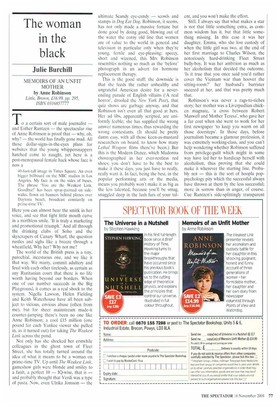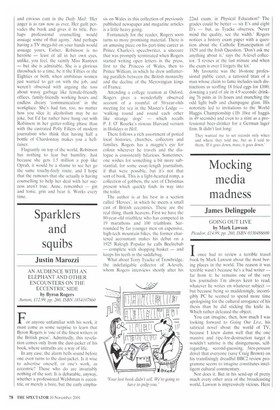The woman in the black
Julie Burchill
MEMOIRS OF AN UNFIT MOTHER by Anne Robinson Little, Brown, £16.99, pp. 295, ISBN 0316857777 To a certain sort of male journalist — and Esther Rantzen — the spectacular rise of Anne Robinson is proof that — why, oh, why? — the world has finally gone mad, All those dollar-signs-in-the-eyes plans for websites that the young whippersnappers hatched came to naught, yet here is a post-menopausal female hack whose face is now a 40-foot-tall image in Times Square. An even bigger billboard on the NBC studios in Los Angeles. My face is on the sides of buses. The phrase You are the Weakest Link, Goodbye!' has been spray-painted on sidewalks, flown on banners behind planes over Daytona beach, broadcast constantly on prime-time TV.
Here you can almost hear the smirk in her voice, and see that tight little mouth curve in a mirthless smile. 'It is truly a marketing and promotional triumph.' And all through the drinking clubs of Soho and the skyscrapers of Canary Wharf, the question rustles and sighs like a breeze through a wheatfield, Why her? Why not me?
The world of the British press is a tiny, parochial, incestuous one, and we like it that way. We marry, commit adultery and feud with each other tirelessly, as certain as any Ruritanian court that there is no life worth having beyond our borders. When one of our number succeeds in the Big Playground, it comes as a real shock to the system. Nigella Lawson, Helen Fielding and Keith Waterhouse have all been subject to vicious, envious abuse (often from me), but for sheer mainstream made-it counter-jumping there's been no one like Anne Robinson; a cool £15 million (one pound for each Yankee viewer she pulled in, as it turned out) for taking The Weakest Link across the pond.
Not only has she shocked her erstwhile colleagues in the ghost town of Fleet Street, she has totally turned around the idea of what it means to be a woman on prime-time TV. Up until The Weakest Link, gameshow girls were blonde and smiley to a fault, a perfect 10 — IQ-wise, that is — and probably thought that Verdi was a type of pasta. Now, even Ulrika Jonsson — the ultimate Scandy eye-candy — scowls and stamps in Dog Eat Dog. Robinson, it seems, has not only made a massive fortune but done good by doing good, blowing out of the water the corny old line that women are of value to the world in general and television in particular only when they're young, fertile and eye-pleasing; speccy, short and wizened, this Mrs Robinson resembles nothing so much as the 'before' photograph in an advert for hormone replacement therapy.
This is the good stuff; the downside is that she feeds the rather unhealthy and ungrateful American desire for a neverending parade of English villains CA real horror', drooled the New York Post), that quiz shows are garbage anyway, and that Robinson isn't even all that good at hers. Her ad libs, apparently scripted, are uniformly feeble; she has supplied the wrong answer numerous times, thus rewarding the wrong contestants. (It should be pretty damn easy, with all those keen-as-mustard researchers on board, to know how many Lethal Weapon films there've been.) But this is the Modern Dance, which Madonna choreographed in her ever-restless red shoes; you don't have to be the best to make it these days, you just have to really, really want it. In fact, being the best, in the popular performing arts or the media, means you probably won't make it as big as the less talented, because you'll be smug, snuggled deep in the lush furs of your tal
ent, and you won't make the effort.
Still, I always say that what makes a star is not that little something extra, as common wisdom has it, but that little something missing. In this case it was her daughter, Emma, who she lost custody of when the little girl was two, at the end of her first marriage to Charles Wilson, the notoriously hard-drinking Fleet Street bully-boy. It was her ambition as much as her alcoholism that decided the outcome. 'Is it true that you once said you'd rather cover the Vietnam war than hoover the sitting-room?' her husband's barrister sneered at her, and that was pretty much that.
Robinson's was never a rags-to-riches story; her mother was a Liverpudlian chicken magnate, 'a cross between Robert Maxwell and Mother Teresa', who gave her a fur coat when she went to work for her first newspaper 'to keep you warm on all those doorsteps'. In those days, before journalism became a glamour profession, it was extremely working-class, and you can't help wondering whether Robinson suffered from privilege-guilt which might in some way have led her to handicap herself with alcoholism, thus proving that she could make it wherever the starting line, Probably not — this is the sort of hoopla poppsychology pity which the successful always have thrown at them by the less successful; more in sorrow than in anger, of course. Cue Rantzen's side-splittingly transparent and envious cant in the Daily Mail: Her anger is as raw now as ever. Her guilt pervades the book and gives it its title. Perhaps professional counselling would assuage some of that agony.' And perhaps having a TV mega-hit on your hands would assuage yours, Esther. Robinson is no heroine — least of all in her own eyes, unlike, you feel, the saintly Miss Rantzen — but she is admirable. She is a glorious throwback to a time, be it the Fifties or the Eighties or both, when ambitious women just wanted to get on with the job, and weren't obsessed with arguing the toss about wussy garbage like female-friendly offices, family-friendly working hours and endless dreary 'communication' in the workplace. She's had fun, too, no matter how you slice it; alcoholism may be no joke, hut I'd far rather have hung out with Robinson in her gutter-rolling phase than with the castrated Polly Fillers of modern journalism who think that having half a bottle of Chardonnay makes you a hellraiser.
Flagrantly on top of the world, Robinson has nothing to fear but humility. Just because she gets 1.5 million a pop like Oprah, it would be a shame to see her go the same touchy-feely route. and I hope that the rumours that she actually is having counselling to help her deal with her success aren't true. Anne, remember — gin and tonic, grin and bear it. Works every time.















































































































 Previous page
Previous page